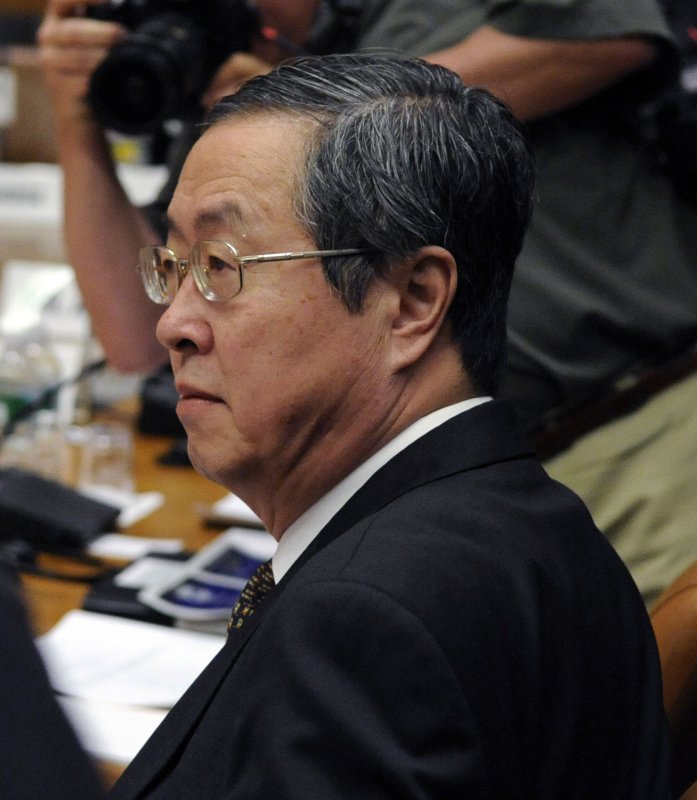Zhou Xiaochuan, Governor of the People's Bank of China, arrives for the International Monetary Fund (IMF) financial committee meeting during the IMF/World Bank spring meetings in Washington on April 25, 2009. (UPI Photo/Alexis C. Glenn) |
License Photo
PARIS, Jan. 3 (UPI) -- Two predictions can be made with confidence about the global economy in the coming year: There will be another crisis for the euro and China's growth rate will be deliberately slowed by government and central bank officials worried by the social and political implications of inflation.
Other things could happen, good as well as bad. The world is always full of surprises. But we know from the Bank for International Settlements that Spain and Italy alone have to refinance half a trillion dollars in debt in the first half of this new year.
We also know that the Chinese authorities are hitting the brakes. Zhou Xiaochuan, the governor of the People's Bank of China, warned that he would be shifting to a "prudent" monetary policy from the "moderately loose" system of the past. Just a year ago he said that "defeating the international financial crisis" was his top priority.
Interest rates were raised again to 5.81 percent over Christmas, just three months after the last rise. And there have been five separate increases in capital reserve requirements for banks in recent months. The three-year money market rate is 6.25 percent. State-owned enterprises have been ordered to return more of their profits to the state which cuts back their investment plans.
The markets know that the slowdown is coming. The Shanghai stock market is down 12 percent in the last two months. HSBC's closely watched manufacturing index fell from 55.3 to 54.4 in December, the first drop in five months. And with inflation soaring, particularly the 12 percent jump in food prices, Beijing authorities are trying to curb the inflows of hot money.
"State Administration of Foreign Exchange stressed the need to strengthen supervision of cross-border capital flows on Dec. 13. It also advocates actively responding to and fighting against hot money and other unusual cross-border capital flows as well as guarding economic and financial interests of national security," reported the official People's Daily.
China is paying the price for the massive $2 trillion lending spree it unleashed in 2009 to fend off recession, says Michael Pettis, professor of finance at Beijing University's Guanghua School of Management. He sees China's growth rate dropping soon to 6 or 7 percent for the rest of this decade.
"Debt levels are worryingly high and starting to act as a serious constraint on rebalancing. It is becoming increasingly difficult for the People's Bank of China to raise interest rates without causing a great deal of financial distress in government-related entities," he said.
Since Europe, Japan and North America are still foundering, China has been the main locomotive for global growth in the past two years. A Chinese slowdown will hurt oil, metal and other commodity prices and make life tougher for exporters from developed economies, like Germany. Fitch Ratings recently published a paper suggesting that if China slows to 5 percent growth, global commodity prices will drop by 20 percent. That will hurt energy producers like the OPEC countries and Russia as well as food and raw material exporters such as Brazil and Australia.
In short, 2011 isn't going to be like last year. China won't be stimulating the world economy in the way that it has been. So the inevitable crisis in the eurozone won't be taking place in the same relatively benign circumstances that it did during the Greek crisis in the spring and the Irish crisis in the fall. And some think the next euro crisis will come quickly.
"The market is not going to wait until March for the EU authorities to get their act together. We could have several sovereign states and banks going under. They are being far too casual," Citibank's chief economist Professor Willem Buiter warned just before Christmas.
"This is a combined sovereign and banking crisis and that is a poisonous cocktail. The policy response has been woefully inadequate. There is a very small pot of money for a very big crisis," he added.
Britain's Center for Business and Economic Research made a new eurozone crisis its No. 1 prediction for 2011, giving the eurozone just a 1-in-5 chance of surviving in its current form. It also noted that if the eurozone didn't break up, this was likely to be the year when the euro weakens toward parity with the already enfeebled U.S. dollar.
No wonder that in Estonia over New Year's Eve, the capital city of Tallin was plastered with posters saying "Welcome to the Titanic," which wasn't the most encouraging way to greet the moment that Estonia gave up its kroon and became the 17th country to join the euro.
The likelihood is that the euro will survive, because of the vast political capital invested in it, but with new rules over budget deficits and private debt and with various kinds of restructuring for the debts of the weaker members. But these new rules, which will push the eurozone much further toward fiscal as well as monetary union, will be imposed just as Europe's various austerity programs really start to bite.
In this context, the surprise of 2011 is likely to be the returning vigor of the U.S. economy, stimulated by the latest tax and budget accord reached between President Barack Obama and the Republicans in Congress. Just after Christmas the Chicago purchasing managers' index, which measures manufacturing activity in the Midwest, soared from 62.5 to 68.6, the highest level since the late 1980s.
Of course, the U.S economy will eventually have to pay for this renewed stimulus but in the meantime it may be one of the few hopeful signs for the coming year.















